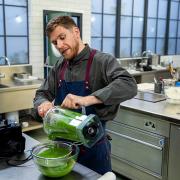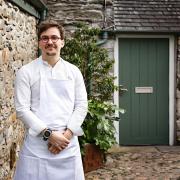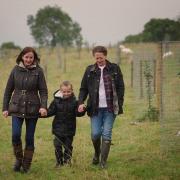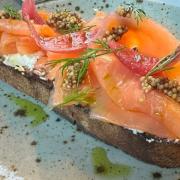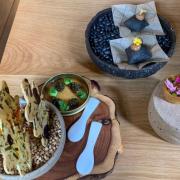Like so many food businesses, the new owners of Companio Bakery in Ancoats have had to adapt. But it’s something that comes naturally to the pair.

Five years ago clinical scientist Baneta Yelda was a refugee from Iraq and Neil Large, a project manager in construction. Today, they own the hugely fashionable artisan Companio Bakery in Ancoats, a place noted both for its organic sourdough bread and long queues of eager customers.
Fuelled by a love of baking bread as a hobby and the opportunity to take a place on an artisan breadmaking course at Alison Swan Parente’s School of Artisan Food – Alison was a judge alongside chef Tom Kerridge on popular BBC show Top of the Shop – Neil left his career behind and decided to pursue his dream.
‘I have always loved baking bread,’ says Neil. ‘Even when I had my hard hat on, inspecting a power station, bread was never far from my thoughts. So, when I saw there was a place on the course, I bit the bullet and applied.
‘It was a six-month residential course, I had to leave my job and jump straight in, which was a bit scary.’
On the course he met Baneta, then working in a London kitchen, who through a Refugee Council grant, secured a scholarship on the same course.

‘It was a change from my work as a clinical scientist in Iraq but, maybe it was meant to be,’ says Baneta. ‘In my home village, my grandparents baked the bread for everyone and, as a girl, I would help them so, maybe it’s in my blood and, after that intensive six-month training course, I can safely say it’s in my brain too.’
The pair quickly realised they shared the same sourdough breadmaking values: everything must be handmade, using time-tested methods with local and organic ingredients. Then came their stroke of luck.
‘We discovered Companio Bakery was for sale. The previous owner shared those same values and, in yet another life changing decision made on the spur of the moment, we bought it from him last year,’ says Neil, who, with Baneta, had just one week to buy the bakery, move to Manchester and open their doors.
‘It was hectic but sometimes you have to take a chance and follow your dream,’ says Baneta. ‘It’s hard work but would we change the surprising direction life has taken? No, we wouldn’t.’
The move has been a gamble worth taking for Neil and Baneta – despite being tested more than they could have planned for. Just a few weeks after their takeover, their special proving fridge broke down. Their only way of getting an effective proving process was to constantly monitor the weather and calculate how it would affect their breads – even if that meant going to the bakery in the middle of the night to bake, going home and then returning at 5am to bake the morning goods, like brioche.

‘We had little control over the process,’ says Neil. ‘It was a full-on month but it was a learning curve. It’s a workout too. Dough is heavy: being a baker keeps me as fit as I was when I was in construction.’
The current crisis has tested them further but the pair have continued to bake and run a pre-order service selling their Ancoats white sourdough and Salford five seed sourdoughs and plan to operate for as long as is possible.
The breadmaking process takes time. Despite just having three ingredients – flour, water and salt –the time you leave it to prove is what helps fermentation and develops flavour. Baking, before coronavirus, would begin on a Sunday, when they went into the bakery to make the sourdough starter. Monday was for mixing, stretching and folding before placing it in bamboo baskets to keep its shape.
Pre-Coronavirus they were baking about 50 loaves a day, including Northern Rose-a classic sourdough made with a range of local flours and Salford five seed, which as the name suggests, contains five seeds including rye chops. Baneta also wanted to include some of the breads she remembers from her childhood in Iraq – her date and cardamom brioche proved a particular hit.
‘My grandparents’ breads wowed the villagers, so I wanted to give the locals here a chance to try them. After all, a bread lover is the same the world over,’ smiles Baneta.
‘The brioche are super for breakfast: a typical Iraqi bread, just as good eaten in the Middle Eastern sun, as in the Lancashire rain.’
The pair supply other retailers and sandwich shops – something they are delighted to do as they see themselves very much as a community bakery. Demand for their bread means they had also started a bread club, where customers who can’t get to Ancoats in opening hours can order in advance and pick up elsewhere. Their breads, wherever they are sold, are often a sell-out. They had also started breadmaking courses, including sessions on Middle Eastern breads using recipes from Baneta’s grandparents.
While they are currently weathering the Covid-19 storm, it looks unlikely Neil or Baneta will ever don a construction helmet or laboratory white coat again – those bakers’ hats are here to stay.
Companio Bakery’s opening days are currently Tuesday, Wednesday, Thursday and Saturday to local customers. They take pre-orders for their Ancoats white sourdough and Salford five seed sourdough in person or via text on 07765914603 only, two days before collection. Collection time is from 9am-noon. Please order only if you can do so within the latest government issued guidelines.
New York deli rye recipe
A blend of three flours and a rye levain or starter create a light and fruity loaf, with added depth and aroma from wholemeal and rye flours and aromatic toasted caraway.
Ingredients
130g rye sourdough starter (see step 1)
288g strong bread flour
20g wholemeal bread flour
223g water
8g salt
3g caraway seeds
Method
To make a mature levain (starter), add 100g of rye flour to 70g of tepid water and mix together until a sticky dough comes together, repeat this daily for three days leaving the levain in a warm environment and in an airtight container – at least 18°C. When bubbles are present in the levain and it has a fermented odour, the levain is ready.
Add all ingredients, starting with the water to a planetary mixer, or large bowl if mixing by hand. Mix on a medium speed and increase to full speed over approximately 10-15 minutes until a strong, extensible dough is achieved, or knead for 15-20 mins until the same point.
Remove mixed dough from mixer or bowl and place the dough into a lightly oiled dough tub, neaten by folding, cover with film or a damp cloth and ferment for approximately 3 hours. The dough will require two additional folds at 30 mins and 60 mins into the fermentation to help build the gluten structure, so, using wet hands neatly stretch and fold the dough whilst in the container without tearing the dough.
Using enough flour to avoid the dough sticking, tip the dough onto a worktop and apply even tension to shape into an even round ball, the dough will tighten and will need to rest again for 20-30 minutes before final shaping.
Now, shape the dough into the desired shape to fit a banneton (round or batard) and place the dough smooth side down into the lightly pre-dusted banneton. Then, we cold prove the dough overnight in the fridge at approximately 4°C
Preheat oven to 240°C, tap out the dough from the proving basket onto a peel or sheet of parchment before finishing with nine angled slashes, using a sharp razorblade. If the slashes are daunting, a simple single slash down the length of the loaf will be just as effective. Pop the dough quickly into the oven onto the hot stone and bake for 30-40 minutes until fully baked and at a colour you’re happy with. Enjoy with good salty butter!






